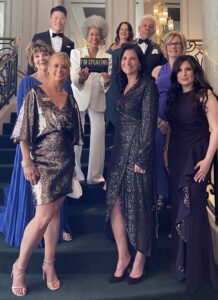
(By Mike McVay) This evening the Alliance for Women in Media will present the 49th Annual Gracie Awards Gala at the Beverly Wilshire Hotel in Beverly Hills, recognizing content creators, performers, and producers involved with programming By Women, For Women, or About Women.
Radio, television, podcasting, streaming, and video are all recognized. Accomplishments that acknowledge the advancement of women are highlighted, too. Last year it was the first full-time female NFL referee, Sarah Thomas. Michelle Obama, Carole Burnett, and national radio personalities like Angela Yee and Ellen K will be among those in the spotlight this year.
Local and Student Honorees will be recognized at Cipriani in New York City during the Gracie Awards Luncheon on June 18. Those content creators, personalities, and producers/writers are honored equally for their connection to a community and their performances.
Despite the hard work of the Alliance for Women in Media, and that of the organization Mentoring and Inspiring Women (MIW), the area that continues to be most lacking in women leaders is Programming. I see this up close and firsthand. I serve on the Board of Directors for the AWM Foundation.
I attend the MIW Lipstick & Lobster gathering at the NAB. I have been assigned women to mentor for both organizations. I enjoy the work that I do for these groups, but I am frustrated that the area of Programming continues to lag in training and developing women to serve as PDs, Brand Managers, or whatever title you choose to use for those who lead the content side of the business.
I grew up in a female-dominant household. My father was present and a great role model and loving parent, but my mother was clearly the CEO of our family. Mainly because my father traveled 3-4 days a week every week of the year. My wife is a strong woman who holds that same CEO role in our family. We have two daughters that are strong women. Our family is a media family with multiple members involved in media as a career. It’s impossible to be a “girl dad” without wanting your children to have the same opportunities as their male counterparts.
My encouragement is for the decision-makers at the radio station level to begin by recognizing creativity and desire. Those creatives who desire to do more than perform on-air should be encouraged. Educate them on Nielsen, content balance, scheduling music (if yours is a music station), coaching talent, organization, and communication. Discuss strategies. Involve the programmer in development in the discussions around station planning and execution.
One of the women I mentor is a Program Director while another is a major market morning personality who wants to be a PD. The former is looking to perfect her craft and advance her career to the next level. She’s already shown through her corporate responsibilities that she has the ability. I’ve suggested she make her goals known. The latter wants to learn the role of PD and be considered the next time such an opportunity presents itself. I’ve encouraged her to request that her management allow her to be involved in coaching the weekend and part-time talent on the station, scheduling music, managing the talent schedule, and participating in sales and promotion meetings.
The research that Mentoring and Inspiring Women puts forward every year shows that women are growing in the role of Market Manager and Sales Manager. It also shows that the amount of women in the Program Director ranks isn’t growing. Women make up approximately 24% of the Market Managers in the Top-100 Markets. Women own 33% of the Sales Manager jobs. Program Directors come in at 11.5%… which is flat from the year before.
There is no reason to not encourage and consider more women for programming positions. Particularly in a world where there are so many backstops and safety nets for first-time PDs – why not start an internal program to train future Program Directors, regardless of gender? It should be evident to all that we need those who want to advance their career further in content creation.
Mike McVay is President of McVay Media and can be reached at [email protected]. Read Mike’s Radio Ink archives here.








Mike, despite the push-back you got on this article I thought your tribute to some of the great female talent you named by name was awesome. I have been in the building of sexist operators but also had Nikki Landry hire me in Memphis after she left SF as afternoon host and became a PD. Let the haters be haters: “An article like this actually does damage to the hard-working, accomplished Women who didn’t rely on an agenda-driven politically motivated opinions.” Bullshit. Not politically motivated, just observational! I was raised in the same household as you and my new wife is CEO for sure. In the words of Beyonce…”Women run the world” If there is a disparity by numbers of GM’s vs. Programmers, maybe that’s intentional because wouldn’t you want to be a GM instead. And women already have that power.
I’d say the above post was a knockout punch. I usually like these articles, but this is too loaded with left-wing conspiracy that women are being hired in management positions but there’s some agenda to keep them out of programming? Sorry, can’t get tangled up in that joke. I also agree with the posters claim that 2 people is a ridiculous sample. Also, personal family stories are fairly irrelevant to accuse radio broadcasters of “not giving women a chance”. What number is a fair number, then? 35% of programming jobs or 67, 93 or 100? Or just the two examples, assuming they’re real?
Statistically, this is a great reference for a poor research piece. The entire industry is in a regression. When that happens, opportunities decline, regardless of whether you’re a Mr. or Mrs. Salaries are often falling, so you could also write a politically-correct article about “Why are Women Salaries Declining in Broadcast Radio?”… it would turn heads, but also be a click-baited inaccurate report because you could also replace women with “Men, Hispanics, etc” .
Also, why are there no on-the-record interviews with an article like this? Just chronicling two un-identified females who can’t seem to catch a break? Why didn’t she request to be involved in the air-check meetings? Lack of confidence, or did her management team feel she just wasn’t ready? Why does one scenario mean the industry isn’t fair to women programmers? That’s a lightweight analysis of an “industry” problem. Imagine this airing as a news story, there’s not one producer that would let this fly: “We spoke with one woman who has the talent but we’re not sure if she asked her boss to assume new duties and even what the bosses response was, and we’re also not sure of the gender of the boss because maybe it’s also a woman, and that would totally de-rail the narrative of this story. Reporting live from a city, in the US, at an unfair radio station, back to you in the studio.”
An article like this actually does damage to the hard-working, accomplished Women who didn’t rely on an agenda-driven politically motivated opinions. Yes, claiming that Radio is un-fair to females who want to be in programming is a political opinion. Why? Because there are no facts about the specific claim, just hyperbole. Look at the research: ” Female representation among General Managers has seen an encouraging uptick to 22.17%, marking a steady increase from 14.9% in 2004.” So, why has female leadership increased but they aren’t hiring female Program Directors?” Maybe that’s the story?! But, no one wants to dig deep, and critically think about the data, and push-back on easy, pre-packaged narratives.
The intimation that the “decision makers” are not recognizing “creativity and desire” is a cheap shot to radio executives, and according to the research, many of whom are women being newly-hired into the GM/leadership role. If women, not hiring women is the story, then just say it. But, you’d have to break ranks with the PC status quo, and there would be less cocktail party invites and intra-industry podcast interview opportunities.
Finally, there IS an internal program to train programmers. It’s called doing the job. It’s sometimes referred to as Assistant Program Director, or Music Director. It’s a paid position, and has been for a long time.
To everyone who has worked their a** off, avoided making excuses and pushed themselves to the limit to excel in radio, or any industry; you’re the example.